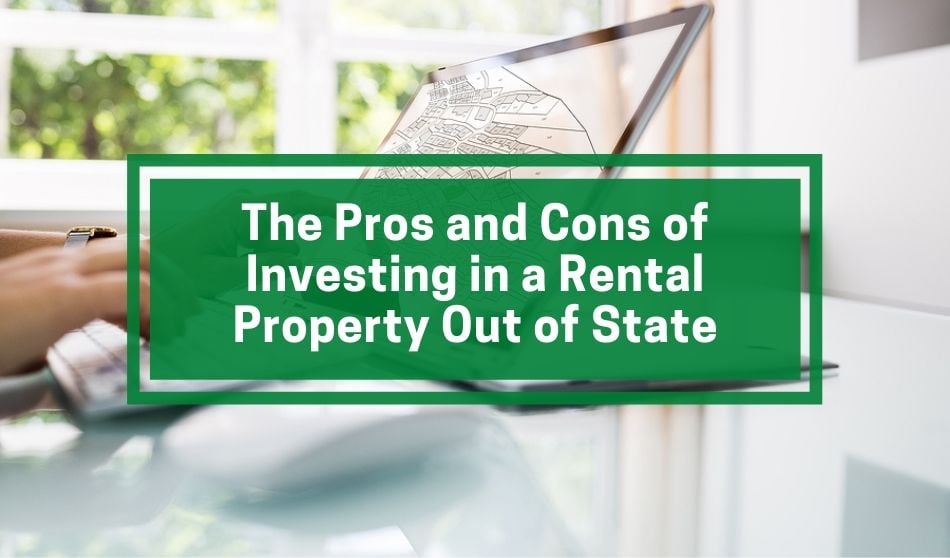When investing in a rental property there are always a lot of factors to consider. If the market in your area doesn’t seem to offer the kind of investment opportunities you are hoping to find, you might find yourself thinking about investing out of state.
While out of state investing can be a lucrative opportunity–especially in comparison to your local real estate market. If you are looking into investing in a rental out of state, there are some unexpected pros and cons that you will need to take into consideration. Here are some potential complications that you may run into when investing out of state, and a few ways to overcome the issues.
Cons of Investing in a Rental Property in Another State:
Investing in an out of state property may be tempting, but overlooking the downsides can leave you in a difficult position. Ensure that you understand the pros and cons before jumping in.
- State-Specific Laws
Landlord-tenant laws vary state-to-state. Moreover, each county and city may have its own local laws. While every landlord or management company should have a lawyer versed in real estate to consult when making policies, you can still risk missing something new. New laws are being passed constantly which can create a big headache to try to keep up. If anything requires a vote to be passed, tax levy increases, for example, you are not a resident and will not have input. Distance is a big barrier, and when you don’t follow local news or routinely check for new laws in the state(s) you own property in you can end up unintentionally on the wrong end of the law.
- Developing a Team is Hard
Assembling the perfect team is hard under the best of circumstances. It can feel impossible when you aren’t local. Finding a great real estate agent, reliable vendors, and an excellent property management team can be significantly more challenging when you don’t have local connections who can provide you with references.
- Need to travel
Even if you decide to have a property manager handle your property’s day-to-day management tasks, it is important to periodically assess your property and ensure that your management team is properly caring for your rental. Additionally, if a large problem like a natural disaster occurs at your rental, you may take an emergency trip to assess any damage.
- Potential for Higher Expenses
Investing out of state can increase your management expenses significantly if you are used to self-managing your property. You will either need to pay property management fees or will need to plan to travel very frequently.
- Finding a Property is Harder
When investing locally, you have the assistance of a real estate agent with whom you have built up a relationship. If you don’t have any local community connections who can provide you with the inside scoop on deals or good neighborhoods, and you don’t have a relationship with an investor-friendly real estate agent, it can be harder to find properties at first.
Pros of Investing in a Rental Property Out of State:
- More Diverse Portfolio
Rental and real estate markets may trend as a whole, but each state will have local factors that directly affect the market in that area. Keeping your portfolio diverse can mitigate losses. Having properties in more than one city, and even in multiple states, can help protect you against a recession or a large local employer facing layoffs in a specific area. Furthermore, issues like property damage due to natural disasters, or new laws that make an area less landlord-friendly will not affect you as much if all of your properties are spread out.
- Better Deals
The promise of a better deal is the main reason that investors will seek to purchase properties in another state. If you live in an area where purchasing properties is highly expensive, you may find that your margins are significantly higher if you invest in a rental property out of state.
- Fewer Barriers to Entry
If you hope to be a first-time landlord, but you live in an area where property values have skyrocketed, becoming a landlord can feel impossible. Finding better deals in other states can be an option for would-be investors who don’t have the financial backing to invest in a property in their area. If you still want to invest in a local property later, you will have more experience investing in a lower-stakes opportunity.
Before Deciding to Invest in a Property Out of State:
Consider Letting Go of Self-Managing:
If you have been a DIY kind of landlord or investor in the past, you may find yourself shuddering at the thought of hiring a team of professionals to complete the tasks you normally tackle. Unfortunately, investing outside of your local area means that you will likely need to let go of self-managing. If you do decide to self-manage, being a long-distance landlord is possible, but only with the right team.
Tips for Long-Distance Landlords:
- Provide an easy way for tenants to pay rent online and submit maintenance requests
- Create a vendor list to ensure vendor integrity when addressing maintenance issues
- Get to know the neighbors and community members located near the rental property
- Neighbors can be enlisted to help to inform you of suspicious behavior at your property
- Have a local friend or family member help you conduct routine inspections, check on maintenance issues, or show a vacant unit if you aren’t able to be there
- Be ready to visit your property regularly
Find out more: 10 Tips Every Long Distance Landlord Needs To Know
Find a Great Realtor and Property Management Team:
To find a great deal and a good property, you will need the insight of a local realtor. Establish a relationship with an investor-friendly real estate agent who can guide you through the ins and outs of the area. This will help you if you decide to invest in another property there, and they may also provide referrals for excellent property managers or vendors that you can rely on.
A lot of the headache of owning an investment property comes from the day-to-day management tasks. These tasks can take time, money, and an infinite amount of patience. If you are attempting to complete them from a distance, they become exponentially more difficult. Instead, consider hiring a property manager who can be trusted to look after your property when you are not there to oversee it. Property managers are responsible for ensuring the right rental price, screening tenants, property maintenance and repairs, owners, landlord-tenant laws, business operations, property records and accounting, and taxes. Since many of these responsibilities require insight to the local area’s market and legal requirements, a property manager can be a worthwhile investment.
Learn more: What Does a Property Manager Do?
Final Thoughts:
Investing in a rental property out of state can have its challenges, but if you are properly prepared, a lot of the issues can be mitigated successfully. If you are thinking about investing in another state and have a solid understanding of the risks and benefits, you may find it is an excellent option for your needs.






